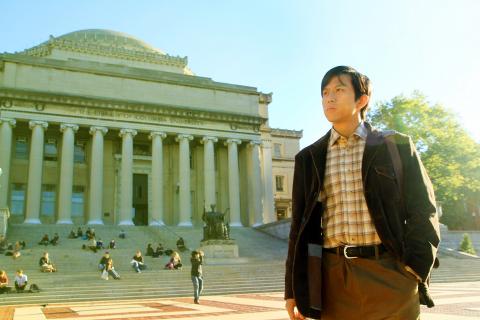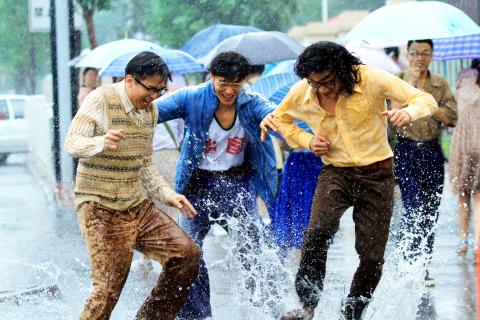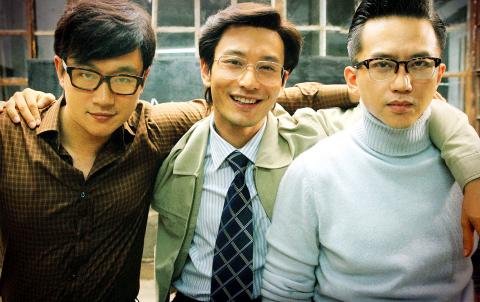After a string of historical action dramas, including The Warlords (投名狀) and Dragon (武俠), Hong Kong director Peter Chan Ho-sun (陳可辛) returns to his favorite theme, love and friendship, with American Dreams in China (海闊天空), an entertaining comedy-drama about three college friends who build a business empire over two decades. The connection of personal stories with society at large recalls Comrades, Almost a Love Story (甜蜜蜜), arguably Chan’s best work, which follows two Chinese whose search for a better life bring them first to Hong Kong and then the US.
However, while the 1996 work tastefully captures the life of the Chinese diaspora and the mood of Hong Kong on the eve of its handover to China, Chan’s latest dramatic offering is more of a cinematic testimony to the growing power of China, a nation now capable of running its own Hollywood and spreading its dogma, non-American style.
In 1980s China, amid sweeping economic reforms, country boy Cheng Dongqing (Huang Xiaoming, 黃曉明), carefree bohemian Wang Yang (Tong Dawei, 佟大為) and the ambitious Meng Xiaojun (Deng Chao, 鄧超) meet and become friends at a university in Beijing. Like their fellow students, who believe that America is their only hope for a better future, the trio prepare for visa interviews to pursue further studies in the US. But only Meng, whose grandfather and father had earned doctoral degrees in America, is able to take off for New York. He tells his friends that he has no intention of returning.

Photo courtesy of Applause Entertainment
Dismissed from his college teaching job and with his girlfriend Mei (supermodel Du Juan, 杜鵑) having left for the US, the disheartened Cheng, together with Wang, sets up New Dream, an English-language school, in an abandoned state-owned factory. Their lessons prove to be a huge hit among Chinese youth thirsting for anything that can help them pass the SAT and GRE exams.
Across the Pacific, Meng waits on tables to make ends meet. Dejected, he returns to China and joins in his old friends’ business venture. As the academy becomes a lucrative national franchise, the trio symbolizes a new generation of entrepreneurs that came of age in 1980s and 1990s China.
However, with success comes friction and dissent. Business divisions increase and alienate the three friends, eventually shattering their friendship. The film reaches its denouement as the three businessmen travel to the US to fight a lawsuit accusing them of intellectual property theft.

Photo courtesy of Applause Entertainment
Narratively speaking, the film tells an engaging, feel-good story about three buddies making it in the big city and embracing each other’s shortcomings in the face of power, money and fame. It plays well with the distinct character types, enjoyably fleshed out by the three Chinese leading thespians, who share sparkling on-screen chemistry. Tong’s romantic disposition makes him the most likeable, while Deng delivers a focused performance as an idealist with a defeated ego. As for Chinese heartthrob Huang, despite his brave move to play against his good looks, he fails to convince as the simple country boy morphing into a sharp businessman.
Iconic pop songs, including Taiwanese pioneering female rocker Julie Su’s (蘇芮) The Same Moonlight (一樣的月光), Greenhouse Girl (花房姑娘) by Chinese rock legend Cui Jian (崔健) and Hong Kong rockers Beyond’s Boundless Oceans Vast Skies (海闊天空), add atmospheric tone to the narration. The character’s lives and their rising fortunes are juxtaposed with important moments in Chinese contemporary history such as the 1999 bombing of the Chinese embassy and Beijing’s failed 2000 Olympic bid. Naturally, the 1989 Tiananmen Square Massacre isn’t mentioned — a calculated commercial omission that will ensure, Chan seems to think, success on the big screen.
In essence, American Dreams in China derives its stamina from a contemporary Zeitgeist: as China has grown to be an important player in world politics and the global economy, people are demanding that their erstwhile American dreams be redefined in Chinese terms. The China-US theme reaches a didactic height when Huang’ character gives a winning speech in front of their American plaintiffs, who are depicted as prejudiced and arrogant. At that moment it becomes blatantly clear that the success of the trio is never the result of American-style individualism, but a collective ideology that finds its roots in the grudges of China’s colonial past.

Photo courtesy of Applause Entertainment
Evidently, the message has been well received by its audience. The film reportedly raked in more than RMB500 million (NT$2.5 billion) in China in less than one month after it opened on May 17.

Photo courtesy of Applause Entertainment

Behind a car repair business on a nondescript Thai street are the cherished pets of a rising TikTok animal influencer: two lions and a 200-kilogram lion-tiger hybrid called “Big George.” Lion ownership is legal in Thailand, and Tharnuwarht Plengkemratch is an enthusiastic advocate, posting updates on his feline companions to nearly three million followers. “They’re playful and affectionate, just like dogs or cats,” he said from inside their cage complex at his home in the northern city of Chiang Mai. Thailand’s captive lion population has exploded in recent years, with nearly 500 registered in zoos, breeding farms, petting cafes and homes. Experts warn the

The unexpected collapse of the recall campaigns is being viewed through many lenses, most of them skewed and self-absorbed. The international media unsurprisingly focuses on what they perceive as the message that Taiwanese voters were sending in the failure of the mass recall, especially to China, the US and to friendly Western nations. This made some sense prior to early last month. One of the main arguments used by recall campaigners for recalling Chinese Nationalist Party (KMT) lawmakers was that they were too pro-China, and by extension not to be trusted with defending the nation. Also by extension, that argument could be

Aug. 4 to Aug. 10 When Coca-Cola finally pushed its way into Taiwan’s market in 1968, it allegedly vowed to wipe out its major domestic rival Hey Song within five years. But Hey Song, which began as a manual operation in a family cow shed in 1925, had proven its resilience, surviving numerous setbacks — including the loss of autonomy and nearly all its assets due to the Japanese colonial government’s wartime economic policy. By the 1960s, Hey Song had risen to the top of Taiwan’s beverage industry. This success was driven not only by president Chang Wen-chi’s

Last week, on the heels of the recall election that turned out so badly for Taiwan, came the news that US President Donald Trump had blocked the transit of President William Lai (賴清德) through the US on his way to Latin America. A few days later the international media reported that in June a scheduled visit by Minister of National Defense Wellington Koo (顧立雄) for high level meetings was canceled by the US after China’s President Xi Jinping (習近平) asked Trump to curb US engagement with Taiwan during a June phone call. The cancellation of Lai’s transit was a gaudy